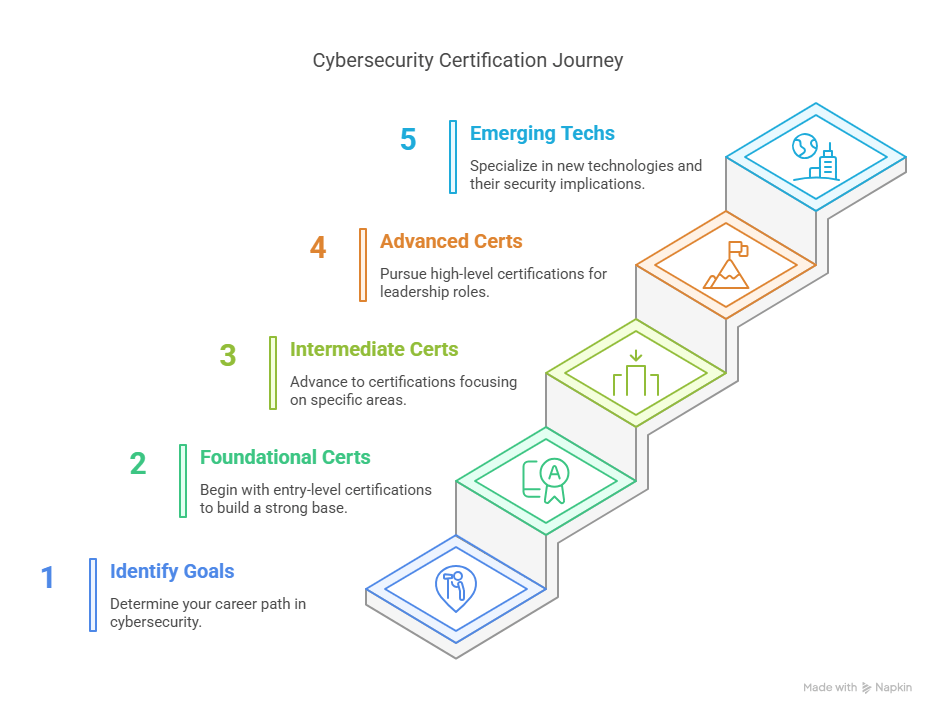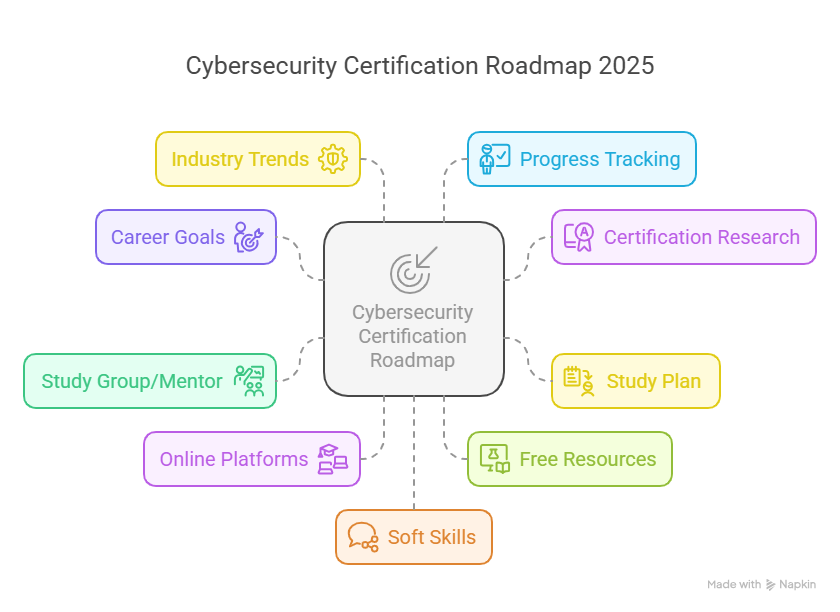Table of Contents
In today’s rapidly evolving cybersecurity landscape, staying ahead of the curve is paramount. With organizations globally facing unprecedented digital threats, cybersecurity professionals are in high demand. However, navigating the vast array of training programs, certifications, and career paths can be daunting. This comprehensive guide to the Cybersecurity Certification Test Roadmap 2025 will ensure that you are equipped to make informed decisions as you progress in your cybersecurity career.
Why You Should Follow the Cybersecurity Certification Roadmap 2025
The demand for cybersecurity professionals has never been higher, and the landscape is continually evolving. Emerging technologies like AI, blockchain, IoT, and cloud security are reshaping the industry, which makes staying current with cybersecurity certifications more crucial than ever.
-
Industry Alignment: The roadmap ensures that your certifications keep pace with technological advancements and emerging security challenges.
-
Career Acceleration: Certifications boost your credibility and make you a strong contender for high-paying roles such as penetration tester, SOC analyst, or cybersecurity consultant.
-
Global Recognition: Many cybersecurity certifications are globally recognized, enhancing your professional marketability worldwide.
Without a structured plan, you may waste time and money on certifications that are less aligned with your career goals. Following the cybersecurity certification roadmap ensures you build a clear, goal-oriented path that aligns with your unique professional aspirations.
Cybersecurity Certification Roadmap 2025 at a Glance
Understanding the path to a successful cybersecurity career starts with identifying your specific goals. Here’s a snapshot of the roadmap:

Step 1: Identify Your Career Goals
Before jumping into certifications, take a moment to assess where you want your career to go. Ask yourself whether you’re interested in offensive security (e.g., penetration testing) or defensive roles (e.g., SOC analyst or incident response). Your choice of certifications will depend on these goals.
Step 2: Start With Foundational Certifications
Starting with a foundational certification like CompTIA Security+ is crucial. This entry-level certification introduces key concepts in cybersecurity, such as risk management, threat detection, and vulnerability mitigation.
Cost: Around $350
Duration: Typically 3-6 months of preparation
Recommended for: Beginners or those looking to shift into cybersecurity
Step 3: Advance to Intermediate Certifications
Once you’ve mastered the basics, it’s time to move on to intermediate certifications that focus on specific areas. For instance:
-
Certified Ethical Hacker (CEH): Perfect for those pursuing offensive roles such as penetration testing.
-
Certified Information Systems Auditor (CISA): Ideal for professionals focusing on governance, risk management, and compliance.
Cost: Ranges from $500 to $800
Duration: 6 months to 1 year
Recommended for: Intermediate-level professionals
Step 4: Pursue Advanced Certifications
For professionals aiming for leadership, consulting, or niche technical roles, advanced certifications are essential. Some of the most recognized advanced certifications include:
-
Certified Information Systems Security Professional (CISSP): This certification is a must for those pursuing senior security roles or management.
-
Offensive Security Certified Professional (OSCP): Known for its rigorous hands-on exam, OSCP is a top choice for penetration testers.
Cost: $700 – $1,200
Duration: 1 year or more of preparation
Recommended for: Experienced professionals looking to specialize
Step 5: Master Emerging Technologies
As the industry progresses, focusing on certifications that address emerging technologies becomes increasingly important. Specializations in blockchain security, cloud security, and AI governance are gaining momentum.
One such certification is the ACSMI Cybersecurity Lawyer Certification, which explores the intersection of cybersecurity and legal frameworks, making it ideal for professionals interested in compliance and governance.
Cost: Varies depending on the certification
Duration: Varies depending on specialization
Recommended for: Experts looking to transition into specialized cybersecurity roles
Emerging Trends in Cybersecurity Certifications in 2025
As we move into 2025, the demand for specialized cybersecurity certifications continues to grow. Here are some of the key trends shaping the industry:
-
Focus on Cloud Security As businesses shift to the cloud, cloud security certifications like Certified Cloud Security Professional (CCSP) are becoming increasingly important. Cloud environments introduce unique security challenges, and professionals with expertise in cloud security will be in high demand.
-
AI and Machine Learning Integration The rise of AI-driven threats like adversarial machine learning means that cybersecurity certifications now include AI-centric content. This trend is expected to continue as AI becomes more integrated into threat detection and prevention strategies.
-
Regulatory Compliance Data protection regulations like GDPR, HIPAA, and CCPA are growing more complex. As a result, certifications focused on compliance and regulatory frameworks are becoming critical for organizations aiming to stay within legal boundaries.
-
Niche Specializations Cybersecurity is not just about preventing breaches—it’s about addressing niche areas such as cybersecurity law, forensic analysis, and incident response. Certifications like the ACSMI Cybersecurity Lawyer Certification and Certified Cybersecurity Forensics Professional are gaining recognition for addressing these specialized needs.
How to Get Started on the Cybersecurity Certification Roadmap 2025
Now that we’ve outlined the roadmap, let’s focus on how you can get started. The key to successfully navigating your It Specialist Cybersecurity Certification journey lies in planning and execution. Here are actionable steps to help you hit the ground running:

-
Set Clear Career Goals Define your ultimate career goals. Do you want to specialize in offensive security, governance, or cloud security? Once you identify your aspirations, you can choose certifications that align with them.
-
Research and Choose the Right Certifications Once you’ve set your career goals, research the certifications that match your ambitions. Read reviews, compare exam requirements, and assess the market demand for each certification. This research helps you identify high-value certifications that will open doors for you.
-
Create a Realistic Study Plan Juggling study time with work and personal commitments can be challenging. Set aside 1-2 hours per day for consistent studying, break down study materials into manageable chunks, and stick to a schedule. Ensure you balance theory with hands-on practice to reinforce your skills.
-
Join a Study Group or Find a Mentor Joining a study group or finding a mentor can significantly accelerate your learning. Peer discussions and insights from experienced professionals will keep you motivated and on track.
-
Leverage Online Learning Platforms Platforms like ACSMI offer over 400 modules that span all levels of cybersecurity certifications. These platforms allow you to learn at your own pace and focus on areas you find challenging.
-
Utilize Free and Supplementary Resources Many high-quality resources are available for free. Take advantage of online tutorials, cybersecurity blogs, and free webinars to supplement your learning. This will give you a deeper understanding of real-world challenges and solutions.
-
Stay Updated on Industry Trends Cybersecurity is a dynamic field. Stay informed by following blogs, subscribing to newsletters, and attending cybersecurity events. The more knowledge you gain, the better prepared you will be for the ever-changing threat landscape.
-
Track Your Progress Regularly assess your progress by taking mock exams and quizzes. This will help you identify areas where you need more focus and ensure you’re fully prepared for the actual exam.
-
Develop Soft Skills Cybersecurity isn’t just about technical knowledge—it’s also about communication and problem-solving. Work on developing your soft skills, as these are essential for interacting with stakeholders and presenting complex ideas clearly.
Final Thoughts
The Cybersecurity Certification Roadmap 2025 is a vital tool for anyone serious about pursuing a career in this ever-evolving industry. By following this roadmap, you will ensure that you stay ahead of the curve, gain recognition, and unlock new career opportunities. Whether you are just starting out or looking to specialize, taking the time to follow a structured certification path will pay dividends in the long run.
FAQ About the Cybersecurity Certification Roadmap 2025
Who should follow the Cybersecurity Certification Roadmap?
This roadmap is suitable for beginners, intermediate professionals, and seasoned experts looking to specialize in a niche area.
Are certifications really necessary for a cybersecurity career?
Yes, certifications validate your knowledge and are often essential for securing better job opportunities and higher salaries in the cybersecurity field.
Which certification should I start with?
For beginners, CompTIA Security+ is a solid entry-level certification. It’s well-respected and covers key foundational concepts.
How long does it take to complete certifications?
Completion time varies based on the complexity of the certification. Entry-level certifications can take a few months, while advanced ones may take 1-2 years of preparation.
Can I pursue cybersecurity certifications online?
Yes, many top institutions, including ACSMI, offer online, self-paced certification programs, making it easy to study at your convenience.

Leave a Reply